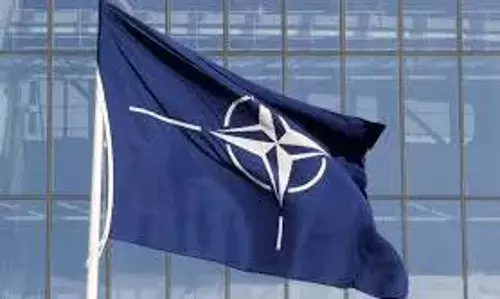
Oslo Accords @ 25
text_fieldsThe Palestinian struggle for freedom can be described as the oldest struggle in the world.
The Palestinian issue is the most burning issue in international politics. A peace agreement also known as the Oslo Accords signed in Washington on September 13, 1993 was a crucial episode in the history of Palestine. Today marks a quarter century since the signing of the agreement. Hence an analysis regarding the current position of the Palestinian issue has great relevance on this day.
Leaders of the Palestine Liberation Organisation (PLO) namely Yasser Arafat, and Mahmoud Abbas, and Israel Prime Minister Yitzhak Rabin and Forign Affairs Minister Shimon Peres entered into the agreement in the presence of the then US president Bill Clinton. Oslo Accords came into existence as a culmination of overt and covert negotiations that had been continuing since April 1992 with the mediation of Norway. The historic agreement was named Oslo Accords because all these negotiations were held in Oslo, the capital of Norway. The signing of the treaty was dubbed a crucial and historic incident by the international media and political leaderships. Plenty of analysis had surfaced concerning the Palestinian issue that it was going to be resolved soon and that the international community was moving closer towards world peace. Shimon Peres, Yitzhak Rabin and Yasser Arafat who were part of the peace accord were awarded the Nobel Peace Prize for that year. However, the reality is that Palestine is currently passing through more severe conflicts than before even on this day as it completes 25 years since signing the agreement.
The main conditions in the accords were the withdrawal of Israeli military from Gaza and West Bank and the formation of the state of Palestine based on the 1967 borders . An assessment of the current status of these aspects is relevant. The fact that Israel has withdrawn from Gaza is technically true. Beyond the fact that it was a withdrawal on their own, it happened following the constant struggles by the resistance movement, Hamas. At the same time, Gaza is still completely under Israeli blockade. Gaza strip is referred to as the world's largest open-air prison. The West Bank, on the other hand, is under the threat of intrusion by the Israeli military any moment. When the treaty was being signed, the number of Israeli immigrants in West Bank was only 11, 066. However, today it has exceeded 6 lakhs. Israel has also constructed a huge barrier already, separating the villages and towns in West Bank. The fact is that the conditions stipulated in the Oslo Accords have not been effectively implemented other than forming an administrative system called a Palestine Authority. The basic necessity of those hapless people of an independent Palestine State still remains a dream.
Right from its beginning, the Agreement which was silent on vital issues like the return of refugees and future of Jerusalem, had attracted criticism as a fundamentally flawed document. The popular resistance movement Hamas had come out with the charge that the power-hungry PLO leadership was making a sell-off of the legitimate rights of the Palestinians. In Hamas's view, there was no alternative other than resistance for Palestinian liberation. Ever since the Oslo Agreement, support for Hamas was seen to have increased too. The reason was that even after the Oslo Agreement, the life of Palestinians did not have any change for the better in quality.
Twenty-five years ago, when Oslo Accords were signed, it was America that presided over it. Although US had on many occasions adopted a pro-Israeli stance in the Palestine-Israeli dispute, all the same it had the role of a mediator. And it had succeeded in creating an impression before the world that theirs was a country making an attempt for a peaceful resolution of the issue. But when now we come to 2018, the striking fact is that even that false pretence has fallen off. By recognizing Jerusalem as Israel's capital and by moving the US embassy from Tel Aviv to Jerusalem, US has become a party to the conflict. That is to say, the Palestinian question is getting more complex without an entity even to play the mediator.
The unchanged reality that remains after all complexities and political transformations, is: the unending tragedy of Palestinians, and their tenacity in struggle which they sustain aflame even in such tragic situation. The global community owes it to itself to view both of these. We have a responsibility in their hardship, as much as we have lessons in their spirit of resistance.























